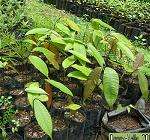Brosimum utile
Brosimum utile (Kunth), also called Galactodendron, Pittier (= B. galactodendron)[1] is a plant species in the family Moraceae.
| Brosimum utile | |
|---|---|
 | |
| Scientific classification | |
| Kingdom: | Plantae |
| Clade: | Tracheophytes |
| Clade: | Angiosperms |
| Clade: | Eudicots |
| Clade: | Rosids |
| Order: | Rosales |
| Family: | Moraceae |
| Genus: | Brosimum |
| Species: | B. utile |
| Binomial name | |
| Brosimum utile (Kunth) Pittier | |
Description
Brosimum utile can grow to a height of 30m.[2] It is monoecious and has bisexual inflorescences.
Distribution and habitat
The range of Brosimum utile, a shade-tolerant species native to southern Central America and northern South America, extends from Brazil and Venezuela to Costa Rica, where it is numerous in the tropical wet forests of Piedras Blancas National Park. This climax-species dominates canopies on well-drained slopes, in addition to thriving in the mountain and upland forests of the Golfo Dulce region.
The tree can be found in the rainforest of Golfo Dulce Retreat, where typical features of this species may be observed, including buttresses from which Brosimum utile's classic white latex may be extracted. Brosimum utile is also cultivated in India, Sri Lanka and Indonesia.[2]
Cultivation
Propagation is from seed or from cuttings.[2]
Uses
The white latex of Brosimum utile is valued for its pharmacological properties and is historically used as a milk substitute by indigenous Central and South Americans. The milk, which contains 5 to 7% protein, can be used for cheese, ice cream, and other products. Taste varies between trees. Some brosmium utile trees have sweet latex, while others are bitter.[3]
The latex of Brosimum utile yields a wax called galactin, which can be used in candles.[4]
The fibrous bark can be used to make cloth, sails, or blankets.[3]
Carbon farming applications
The leaves and branch tips can serve as cattle fodder. The edible nuts and fruits can be eaten boiled or salted, and can also be used for pig feed.[2][3]
References
- "GRIN Species Records of Brosimum". Germplasm Resources Information Network. United States Department of Agriculture. Archived from the original on 2009-01-20. Retrieved 2010-11-23.
- Fern, Ken (2019-06-05). "Brosimum utile - Useful Tropical Plants". Tropical Plants Database, tropical.theferns.info. Retrieved 2019-06-06.
- Toensmeier, Eric (2016). The Carbon Farming Solution: A Global Toolkit of Perennial Crops and Regenerative Agriculture Practices for Climate Change Mitigation and Food Security. Chelsea Green Publishing. p. 180. ISBN 978-1-60358-571-2.
- Fairchild, David. "The Ramon Tree of Yucatan (Brosimiim alicastrum)" (PDF). Florida State Horticultural Society Proceedings, Volume 58. p. 200.
| Wikimedia Commons has media related to Brosimum utile. |
- Contributions from the United States National Herbarium. Smithsonian Institution 20:102. 1918